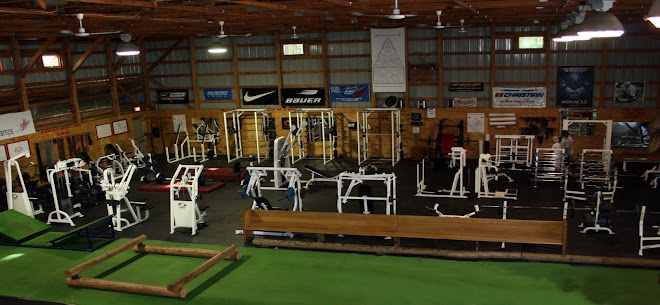10/14/05
Tryouts are over. Teams have been picked. The time is now, the time for the games to begin.
As the 2005 hockey season begins, it is important that you have prepared. The better you have prepared, the better you will play. For those of you that have trained with us this summer, you are already one step ahead of the rest. You have trained smart and trained hard, so good things will happen.
However, just because the season has started does not mean your training stops. In-Season Training is just as important as Off-Season Training. The season is long, typically about 20 weeks. If you do not continue to train, you will lose the conditioning base that you worked so hard to build over the summer months in just 6-8 weeks! The season will not even be half way over yet and you could be starting to fatigue! The idea behind In-Season Training is two fold:
1) To maintain what you have built over the summer months (strength, speed, power, endurance, flexibility, and your mental edge)
2) To improve on the little things to become a better hockey player during the playoffs (speed, quickness, balance, hands, head, heart, and your mental edge) After all, the playoffs are what make a season memorable! The focus during the hockey season needs to be on your performance on the ice. In-Season Training should be short and focused. Keep in mind that games do not keep you in “game shape.” To stay in “game shape” you need to continue training all season long.
Because everyone’s seasons are different (number of games, amount of travel time, level of play, etc.) you need to develop an in-season program that works well for you and fits into your schedule. Here are a few guidelines to follow:
· Continue to work your “core” daily
· Do flexibility work before and after every practice, game, or workout
· Perform combination training 2-3 times a week (strength training-weights, power training- plyometrics, and speed training-sprints)
75% of your speed training should be done on the ice
· Do not train within 48 hours before a game
· Do not spend more than 1 hour for each workout
· Spend more time handling the puck, both on and off the ice
· Constantly study the game (watch NHL and college games on TV, listen to coaches, and watch your peers)
· Drink plenty of water each day
· Eat a balanced diet, especially the night before a game
· Get at least 8 hours of sleep, especially two nights prior to a game
Following these guidelines will help maintain what you have developed during the summer months; you might even see some improvements in your strength, speed, and power.
If you have any questions, feel free to contact me at hockeystrength@hotmail.com
Check the website every couple of weeks as I will be posting articles on “Plyometrics,” “Running Fast –vs- Skating Fast,” “Hockey is a 1 Leg Sport,” “1,000 Abs,” and others.
GOOD LUCK to all of you!
Yours in Hockey - Joe
Friday, November 13, 2009
Subscribe to:
Post Comments (Atom)



No comments:
Post a Comment